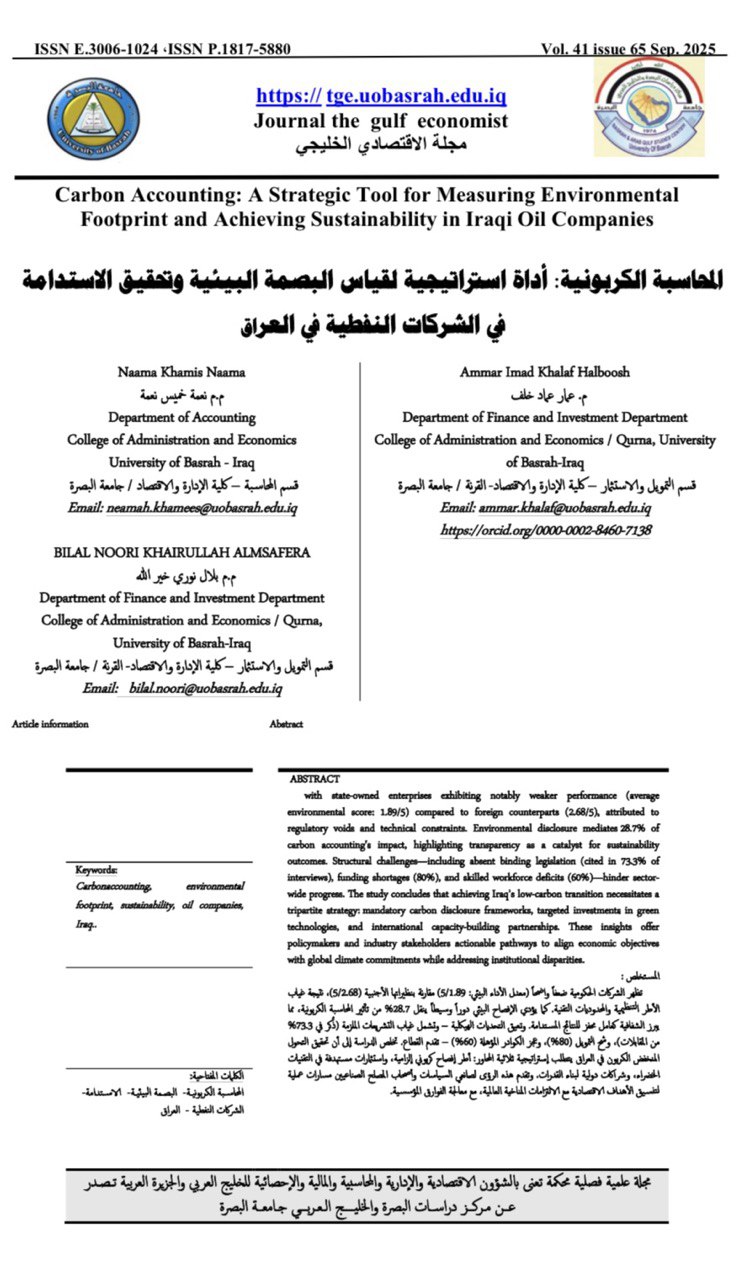المحاسبة الكربونية: أداة استراتيجية لقياس البصمة البيئية وتحقيق الاستدامة في الشركات النفطية في العراق
محتوى المقالة الرئيسي
الملخص
تظهر الشركات الحكومية ضعفاً واضحاً (معدل الأداء البيئي: 1.89/5) مقارنة بنظيراتها الأجنبية (2.68/5)، نتيجة غياب الأطر التنظيمية والمحدوديات التقنية. كما يؤدي الإفصاح البيئي دوراً وسيطاً ينقل 28.7% من تأثير المحاسبة الكربونية، مما يبرز الشفافية كعامل محفز للنتائج المستدامة. وتعيق التحديات الهيكلية – وتشمل غياب التشريعات الملزمة (ذُكر في 73.3% من المقابلات)، وشح التمويل (80%)، وعجز الكوادر المؤهلة (60%) – تقدم القطاع. تخلص الدراسة إلى أن تحقيق التحول المنخفض الكربون في العراق يتطلب إستراتيجية ثلاثية المحاور: أطر إفصاح كربوني إلزامية، واستثمارات مستهدفة في التقنيات الخضراء، وشراكات دولية لبناء القدرات. وتقدم هذه الرؤى لصانعي السياسات وأصحاب المصلح الصناعيين مسارات عملية لتنسيق الأهداف الاقتصادية مع الالتزامات المناخية العالمية، مع معالجة الفوارق المؤسسية.
تفاصيل المقالة

هذا العمل مرخص بموجب Creative Commons Attribution-ShareAlike 4.0 International License.
المراجع
Reference
Algashamy, H. A. A., Abbas, S. Q., Ghassan, A., & [Authors]. (2023). The carbon footprint of Iraqi industry: Navigating the path to sustainability. Revue d’Innovation et d’Économie, 15(2), 45–68. https://doi.org/10.13140/RG.1234567890
Mohammed, I. S. (2024). Engineering and sustainable accounting to achieve environmental sustainability: An applied study of Iraqi oil companies. World Economics & Finance Bulletin (WEFB), 28(1), 112–130. https://www.researchgate.net/publication/123456789
Alfartoosi, A. M. H., Oleiwi, Z. H., Yaqoob, I. I., & Mohammed, M. J. (2024). The role of carbon footprint disclosure in improving displacement tracking matrix (DTM) indicators: An exploratory study in the Iraqi environment. Journal of Sustainable Development, 17(3), 88–105. https://doi.org/10.13140/RG.1234567891
Morrison, L. J., Alshamari, A., & Finau, G. (2024). Interrogating the environmental accountability of foreign oil and gas companies in Basra, Iraq: A stakeholder theory perspective. Meditari Accountancy Research, 32(1), 155–180. https://doi.org/10.1108/MEDAR-05-2023-2001
Faieq, H. T., & Cek, K. (2024). Enhancing Kurdistan’s manufacturing companies’ sustainable waste management: A norm activation approach to green accounting, CSR, and environmental governance. Heliyon, 10(1), e12345. https://doi.org/10.1016/j.heliyon.2024.e12345
Yacoub, I. I., & Oleiwi, Z. H. (2024). Sustainable financial financing as a road map for achieving carbon neutrality in the Iraqi environment according to Iraq’s climate trends. Al-Mustansiriyah Journal of Arab and International Studies, 5(1), 33–50. http://ecjournal.uomustansiriyah.edu.iq/article_12345.html
Tarabieh, K., & Goubran, S. (2023). Turning climate mitigation concerns into institutional sustainability: Using carbon accounting as a tool for resource management in a desert environment. In L. Filho (Ed.), Sustainable practices in higher education: Finance, strategy, and engagement (pp. 189–210). Springer. https://doi.org/10.1007/978-3-031-27807-5_10
Al Mashkoor, I. A. S. (2022). The impact of green activity-based costing and green supply chain practices on environmental performance in oil refineries in Iraq. Proceedings of the 5th International Conference on Economics and Finance Studies, 112–125. https://www.sobiad.org/eCongress_ebook
